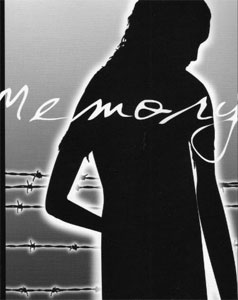| As real as you can get |
At Theatr Clwyd |
| Clwyd Theatr Cymru- Memory , Chapter Arts Centre Cardiff , December 10, 2006 |
 “The recovery of memory is a present-day activity. It’s not the past. Memory occurs in the present, memory must live in the present and it must be truthful.” Jonathan Lichtenstein
“The recovery of memory is a present-day activity. It’s not the past. Memory occurs in the present, memory must live in the present and it must be truthful.” Jonathan Lichtenstein We see daily on our television screens and read in newspapers, all too frequently, examples of the inhumanities that human beings, both individually and collectively inflict upon one another, In Darfur, Zimbabwe, we witness the slaughter of innocent people in Iraq and in the Arab, Israeli conflict. We now have a day set aside commemorating the terrible holocaust of the Second World War. But all these happenings we can easily set to one side as we are, for most of the time, personally far removed from these difficult situations. Watching a group of actors gathering together to act the parts of actors gathering together to rehearse a play seems an unlikely situation in which our emotions will be engaged. This is only the second play from writer Jonathan Lichtenstein but he is undoubtedly an emerging master of the art of theatre. The human truths and realities that eventually emerge from his stories become all the more gripping and immediate as the ‘rehearsal’ turns into the play and the play into gut crunching reality and the emotion seems to embrace us even stronger, as it arises from within this unique situation. At one point, actress Barbara now playing Eva, an incomparable, towering performance from Vivien Parry, forgets her lines at a particularly poignant moment in the drama, Ben, the director of the play. Ben, an assured performance of calm authority from Christian McKay prompts her. This is at a point deep into the play, we know all the characters very well and have been drawn with great sympathy into their situation:- Ben. Stop crying, the guards say. Barbara/Eva. Stop crying, the guards say. Ben. Or I will shoot you. Barbara/Eva. Or I will shoot you. Ben. But the boy could not. Barbara/Eva. But the boy could not. The repetitions double our agony. As well as an actor Christian McKay is an accomplished pianist, his delicate embracing of Bach’s variations breathes a touch of apposite beauty in to the atmosphere of the evening. He is the first to arrive, he sits at the piano and plays as he waits for his actors to turn up. They are a relaxed, charming and disarming bunch, all at ease with their lives and each other. The stage is partly set, we see a wall; the torn down Berlin Wall - the evolving Israeli barricade. The author succeeds with his demand, to give the play its fullest strength, that the actors move from rehearsing to ‘being’, instantaneously. This they all accomplish with extreme commitment and passion. Barbara cajoles one of the boys, picks up a walking stick and moves to the centre of the stage, her body crumples a little, her face, in an instant, takes on the expression of someone who has endured many deeply troublesome experiences and she becomes Eva . Eva’s story begins in Berlin in 1937. She shares her life very happily with two carefree young men Aron, like her a Jew and Felix, a Gentile. Eva eventually marries Aron and they have three or is it two children? Aron and Felix develop a very successful shoe manufacturing and selling business. This harmony is soon broken Felix returns to the allotment, where they’d all shared many good times, in full Nazi uniform his jack-boots manufactured by the firm he now solely owns. The outcome, like the outcome for many millions at this time, was not good. The deeper agonies behind Eva’s story are drawn out of her. Now 1990, she is visited in her flat in Berlin, known to be dying , by the son of her eldest child, who escaped to England at the time of the war. Another skilful and warm performance from Lee Haven-Jones. Like all the cast Simon Nehan as Aron and Daniel Hawksford as Felix play with a convincing reality that both disturbs and penetrates. Returning to the rehearsal room is an ingenious device that allows the author to tell two stories. Ifan Huw Dafydd, again so wonderfully convincing and such a joy to watch is an elderly Palestinian in present day Bethlehem wanting only to live in peace and tend his garden. He develops a great rapport with Issac, a young Jewish engineer sent to commandeer his house. Oliver Ryan creates a very likeable lad. Two really decent people having to perpetrate and endure indecent behaviour, and it all happens before our eyes. And we feel it. We feel it. Memory by Jonathan Lichtenstein, directed by Terry hands, as real as theatre can get. |
Reviewed by: Michael Kelligan |
This review has been read 2797 times There are 127 other reviews of productions with this title in our database:
|
